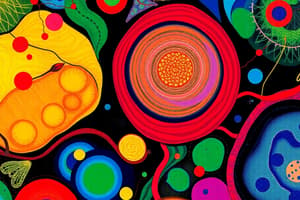Podcast
Questions and Answers
What is the core concept that lies at the heart of biology?
What is the core concept that lies at the heart of biology?
- Natural selection
- Gene expression
- Protein folding
- Cell theory (correct)
Which field in biology focuses on exploring the structure, function, growth, division, death, and differentiation of cells?
Which field in biology focuses on exploring the structure, function, growth, division, death, and differentiation of cells?
- Ecology
- Biochemistry
- Genetics
- Cell Biology (correct)
What serves as the basis for understanding organisms ranging from bacteria to humans?
What serves as the basis for understanding organisms ranging from bacteria to humans?
- Protein folding
- Cell differentiation
- Gene expression (correct)
- Membrane structure
Which discipline explores living organisms and their interactions with one another and the surrounding environment?
Which discipline explores living organisms and their interactions with one another and the surrounding environment?
What do biologists use to explain complex systems like gene expression, protein folding, and ecological relationships?
What do biologists use to explain complex systems like gene expression, protein folding, and ecological relationships?
Which aspect of biology spans fundamental questions about life's origins and evolution?
Which aspect of biology spans fundamental questions about life's origins and evolution?
What does the field of Developmental Biology primarily investigate?
What does the field of Developmental Biology primarily investigate?
Which field is concerned with the classification and naming of living things?
Which field is concerned with the classification and naming of living things?
What aspect does Molecular Biology primarily examine?
What aspect does Molecular Biology primarily examine?
Which discipline is involved in addressing factors affecting populations of individuals?
Which discipline is involved in addressing factors affecting populations of individuals?
What contributes to the power of biology as mentioned in the text?
What contributes to the power of biology as mentioned in the text?
What do innovations in biology mainly do as per the text?
What do innovations in biology mainly do as per the text?
Flashcards are hidden until you start studying
Study Notes
Introduction to Biology
Biology is a vast and multifaceted discipline that explores living organisms and their interactions with one another and the world around them. It covers everything from the tiniest molecules and cells to entire ecosystems and the planet itself, spanning both fundamental questions about life's origins and evolution and applied fields like medicine, environmental conservation, and agricultural productivity.
Core Concepts
At the heart of biology lies the concept of cell theory, positing that life consists of cells, all descended from a common ancestor based on Darwin's principle of natural selection. Understanding the structures and functions of cells—their membranes, cytoplasm, DNA, proteins, and organelles—forms the basis for understanding organisms ranging from bacteria to humans.
To explain these complex systems, biologists develop theories and models—such as those describing gene expression, protein folding, and ecological relationships among species. These frameworks help us understand everything from simple chemical reactions to the workings of large organs and organisms themselves.
Divisions of Study
With such a wide range of topics to cover, biology is divided into specialized branches, each focusing on specific aspects of life. Some key divisions include:
- Cell Biology: Exploring the structure, function, growth, division, death, and differentiation of cells.
- Developmental Biology: Investigating how organisms grow and change over time, from fertilization to adulthood.
- Evolutionary Biology: Studying the patterns and processes behind adaptation, speciation, extinction, and phylogeny.
- Molecular Biology: Examining the interaction of genes and their products, especially proteins, at the molecular level.
- Systematics & Taxonomy: Classification, identification, description, comparison, and naming of living things.
- Population Biology: Addressing factors affecting populations of individuals and their trajectories over time.
These disciplines often overlap, providing integration and holistic views of life's complexity. But they also contribute independently, advancing knowledge through rigorous experimentation, mathematical modeling, computational simulation, and observation.
Applications and Outlook
Innovations in biology touch nearly every aspect of modern society. From medical breakthroughs, preventing diseases and extending lifespans, to developing sustainable food supplies and protecting wildlife habitats, biology shapes the future. Its power comes from asking and answering questions, pushing boundaries, finding connections, and embracing uncertainty. As we delve deeper into the mysteries of life, the potential for further discoveries remains limitless.
Studying That Suits You
Use AI to generate personalized quizzes and flashcards to suit your learning preferences.




